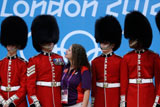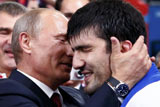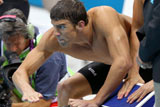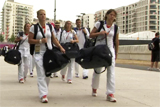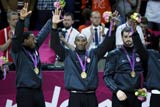Safety net for young gymnasts
Updated: 2012-08-09 07:36:04
By Wang Xiaodong and Zhou Lihua in Xiantao, Hubei ( China Daily)
|
|||||||||||
Basic classes give a chance in life to those who get cut
Eight children, all in red leotards, limber up on giant floor mats, with their eyes occasionally glancing at a portrait on the wall of Li Xiaoshuang, a former world gymnastics champion and local hero. Each dreams of the day their picture will hang beside it.
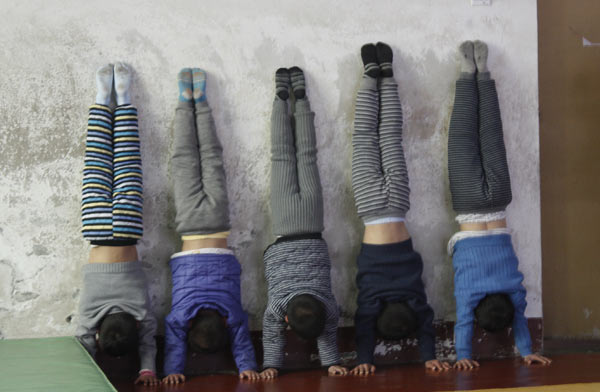 |
|
Children practice doing handstands at the Li Xiaoshuang Gymnastics School in Xiantao, Central China's Hubei province. Zhu Liudi / for China Daily |
"There are usually far more students than this," said Zheng Shunsheng, a coach at the Li Xiaoshuang Gymnastics School. "These kids are training for a competition in August. But it's the summer break, so the rest of the students are at home resting."
Welcome to Xiantao, in Hubei province, the home of gymnastics.
For decades, this city has produced a steady stream of world-class athletes, including four Olympic and world championship gold medal winners.
Yet, for every child that has passed through its sports-focused education system and achieved glory, hundreds more have fallen by the wayside, often finding they lack the skills to get even a basic job.
Even some former national champions had to rely on heavy manual labor to survive after leaving the national teams because they lacked necessary skills in all but sports.
Education authorities say that is one tradition they aim to bring to an end.
"We used to select youngsters (for our training programs) with the sole aim of turning them into gold medal winners, but we ignored the need to give them general education," said Li Yong, director of the general office of the city's sport administration.
"Only a very small proportion of students are selected by the provincial or national teams. Most who fail may have wasted time and couldn't keep up with others after they chose to study at a regular school.
"We're doing more to improve the general education of students at gymnastic schools, including working with the education commission to find the best teachers in the city."
Xiantao, a city of only 500,000, and its neighboring areas traditionally produce people of small stature who are able to bear hardship, which makes them perfect for gymnastics.
Its people have gone on to 100 gold medals at Chinese and international competitions, including Li Xiaoshuang, who won gold at the Barcelona and Atlanta Games as well as the men's all-round event at the World Gymnastics Championships in 1995.
Tough competition
"Due to its success, the city attracts many parents from across China to send their children here with a championship hope," said Yan Yongping, a coach for three decades at the Li Xiaoshuang Gymnastics School.
The boarding school recruits mostly children aged 3 to 8. It has produced four world gymnastics champions since the 1970s.
However, behind the city's success in sports competitions are strict training and selection standards, which means most students who started to train in gymnastics schools as early as 3 years old quit years later if they were not selected by the provincial or national teams.
"The chance of succeeding in sports competition is very slim," said Zheng, as he coached the eight children in an otherwise empty 2,000-square-meter gymnastics hall.
Although the school looks ordinary from the outside, old and gray, the hall inside is modern and new. The boys were practicing basic gymnastic skills such as twirling with their arms on a low balancing beam and doing somersaults.
"I've coached about 240 youngsters over the past few years," Zheng said. "Nowadays, parents are also becoming more realistic, and most of them send their children here to get exercise or learn independence, not to become a champion."
Yang Rui, principal of the school, said that as China is winning more gold medals in international competition, some people question the selection system.
"We realized the aim of education in sports schools is to cultivate talent, rather than just produce medal-winning machines," he said, adding that the school began integrating general education into the curriculum last year.
The school, most of whose students are 4 to 8 years old, is cooperating with the best kindergarten in the city, asking it to send qualified teachers to ensure the students will have the same general education curriculum, such as music and basic sciences, as other children do at normal schools.
Qualified teachers
However, finding enough teachers remains a problem.
"According to the requirement of General Administration of Sport, all sports school trainees must first pass general education before entering competitions to be selected for higher-level schools or teams in the future," Yang said.
A guideline issued in 2010 by the State Council required public sports schools to take more measures to improve general education and employment for sportsmen, and education departments to send qualified teachers to public sport schools.
However, more effort is needed to realize what are promised in the guideline, said Liu Peng, minister of General Administration of Sport, in a televised speech on July 3.
Despite giving more importance to general education in sports training, the "home of gymnastics" still plans to continue its glory in sports competitiveness by popularizing gymnastics and other sports.
"We are considering popularizing gymnastics at our kindergartens," Li Yong said. "It can provide a fun option for kids and give us the opportunity to identify and select the ones with gymnastics talent.
"Besides, we also plan to develop other sports, such as weightlifting and diving, in which we have already made great progress, to further improve our competitiveness in sports competition," Li said.
Players who are selected to continue at a higher level practice hard and dream of winning medals.
"I'll take part in the National Games next year, and I hope I can win at least a third place in a gymnastics event," said Xu Hua, a member of the Hubei provincial gymnastics team in Wuhan.
At 20 years old, he has been practicing gymnastics for more than 15 years, including 10 years with the provincial team. Xu said he was selected by a coach at his kindergarten and sent to a gymnastics school in Wuhan when he was 5 and a half years old.
"About seven of my classmates at the gymnastics school were chosen and sent to the provincial team along with me, when I was about 10 years old. Now, only two are still here," Xu said.
"Though the competition is fierce, I'm not worried. Every one of us here has a chance of winning a gold medal," he said with confidence, referring to the others training in the gymnastics hall in Hubei's Olympic Sports Center.
"If I fail in the National Games, I might quit and apply to a college to study," he said.
Contact the writers at wangxiaodong@chinadaily.com.cn and zhoulihua@chinadaily.com.cn
Related Stories
Chinese gymnasts shine again 2012-08-08
China's Deng Linlin wins women's beam gymnastics Olympic gold 2012-08-07
Feng wins third gymnastics gold for China at London Olympics 2012-08-07
Gymnast Chen shows class, netizens say 2012-08-07
China wins men's team gymnastics 2012-07-31
China's injured Teng pulls out of Games 2012-07-26
Photo Gallery
Medal Count |
||||
| 1 | 46 | 29 | 29 | |
| 2 | 38 | 27 | 22 | |
| 3 | 29 | 17 | 19 | |
| 4 | 24 | 25 | 33 | |
| 5 | 13 | 8 | 7 | |
| 6 | 11 | 19 | 14 | |


